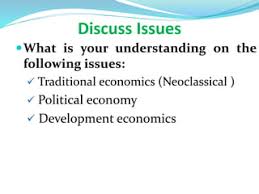
Eco. 361 (Online Discussion/Quiz–Competing Theories of Economic Development–15/7/2024)
1. Classical or neo-classical economics is concerned primarily with the efficient and cost effective allocation of scarce resources and with the optimal growth of those resources over time. They hold that countries develop economically via the market. In view of this clearly discuss development Economics is an Extension of both Political and Traditional Economics.
2. The structuralists focus on the mechanism by which “underdeveloped” economies transform their domestic economies from a traditional subsistence agricultural base into a modern economy. Do you agree? Also discuss the other tenets of the Structuralist Economic Thinkers.
3. Walt W. Rostow’s Stages-of-Growth Model Viewed Economic Development as a Linear Process. Rostow argued that advanced countries had all passed through a series of stages. Clearly explain these series of stages in details and show where Nigeria is operating currently with vivid examples and convincingly.
4. Neo-Marxist economists accepted Marxist philosophy in principle but argued that it had to be modified if it was to be applicable to developing countries. The difference was expropriated by the capitalists – the private owners of the factories and the machines. The neo-Marxists gave this theory an international dimension based on the behavior of nations. Hence they concluded that industrialized countries historically extracted surplus value from developing countries. Do you agree? Clearly discuss the assumptions of the Neo Maxist Theory in details
5. According to the Neo Classicals, Private Markets, Not Government Intervention, Are Critical for Development. Again, they argued that economic stagnation in developing countries was a by-product of poorly designed economic policies and excessive state interference in the economy. Explicitly explain and discuss the postulations of the Neoclassical School and their relevance for the Nigerian Economy.





